In the early 1930's, when the Nation of Islam had just come into existence, its founder made the bold prediction that, one day, Islam would replace Christianity as the primary faith of black Americans. At the time, this assertion must have sounded incredible, if not slightly mad; not only was the Islamic faith broadly despised in the United States, but African-Americans who were Muslim numbered at that time only in the dozens. By 1959, however, a perverse endorsement of this same prediction would issue from, of all people, a top leader of the Ku Klux Klan. In a letter to the New York City police commissioner, that white supremacist wrote: "If we fail to stop the Muslims now, the sixteen million niggers of America will soon be Muslims, and you will never be able to stop them."
Today, that 1930's prediction no longer seems so outlandish - indeed, it has already been partially borne out. About one million African-Americans now identify themselves as Muslims, and a visit to the black sections of any fair-sized American town quickly confirms the presence not only of an Islamic infrastructure - mosques, schools, halal butchers, stores carrying Islamic clothing - but of an active and ambitious drive to propagate Islam. So vital is this movement that the director of a Christian effort to stem its headway has made a memorable prediction of his own: "If the conversion rate continues unchanged, Islam could become the dominant religion in black urban areas by the year 2020."
Malcolm X vs. Elijah Muhammad
 A 1999 postage stamps in his honor symbolizes the establishment's acceptance of Malcolm X (1925-65). |
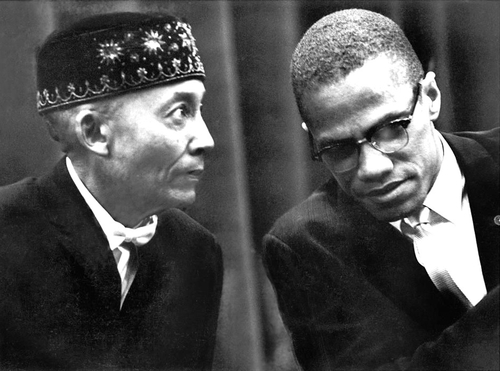 Elijah Muhammad (L) and Malcolm X. |
In the final analysis, it was another man, Malcolm X's mentor, who had the greater impact on establishing Islam among African-Americans. This was the uncharismatic, inarticulate, heterodox, and long-lived Elijah Muhammad. During his lifetime - he was born in 1897 and died in 1975 - he was a mysterious figure, the subject of rumor and innuendo. He told contradictory stories about himself, avoided the press, surrounded himself with a wall of bodyguards, and punished those who revealed information about him. But recent scholarship has pieced together his story, mostly thanks to law-enforcement records. For, starting in 1932 and continuing for over four decades, police agencies kept extremely close tabs on him, including (as part of the controversial COINTELPRO program) by means of extensive FBI wiretaps and letter-openings. The resulting reports, now available to researchers in all their immensity - the FBI's papers alone amount to well over a million pages - reveal the most intimate secrets of Elijah Muhammad's household, his power struggles, and his personal and sexual escapades.
 Two authors, both black, have done yeoman work culling these archives (as well as other relevant documents), and have produced impressively researched biographies of the man who liked to be called the Messenger of Allah. Claude Andrew Clegg III's An Original Man: The Life and Times of Elijah Muhammad (St. Martin's, 377 pp., $25.95) appeared in 1997; a well-rounded biography by a professor of history, it is also perhaps the best book ever written on the Nation of Islam. And now there is also The Messenger: The Rise and Fall of Elijah Muhammad, (Pantheon, 667 pp., $28.50) by Karl Evanzz, a journalist at the Washington Post; depending heavily on the police files, Evanzz provides more new information but also a somewhat skewed picture, since he tends to neglect matters (like theology) with which the FBI did not concern itself.
Two authors, both black, have done yeoman work culling these archives (as well as other relevant documents), and have produced impressively researched biographies of the man who liked to be called the Messenger of Allah. Claude Andrew Clegg III's An Original Man: The Life and Times of Elijah Muhammad (St. Martin's, 377 pp., $25.95) appeared in 1997; a well-rounded biography by a professor of history, it is also perhaps the best book ever written on the Nation of Islam. And now there is also The Messenger: The Rise and Fall of Elijah Muhammad, (Pantheon, 667 pp., $28.50) by Karl Evanzz, a journalist at the Washington Post; depending heavily on the police files, Evanzz provides more new information but also a somewhat skewed picture, since he tends to neglect matters (like theology) with which the FBI did not concern itself.
As it happens, the two biographers disagree on a dismaying number of details, which suggests that much work on this topic remains to be done. In the main, though, their accounts complement each other and make it possible, for the first time, to understand who exactly Elijah Muhammad was.
Early Years
He was born Elija Pool in Sandersville, Georgia, in 1897, the seventh of thirteen children. Georgia at that time was a racist, violent place, and young Elija grew up with searing experiences of white scorn and brutality. The lynching of a friend in 1912 prompted him to flee his parent's house a year later. In 1917 he met Clara Belle Evans and in 1919 married her; between 1921 and 1939, they had eight children.
 Pool fled Georgia for Detroit in 1923 and then, in the classic pattern of black migration to the north, called for his family to follow. In Detroit, he worked in several industrial plants and joined a variety of organizations - notably, Marcus Garvey's proto-black-nationalist movement, the United Negro Improvement Association (UNIA), and the Black Shriners; but neither of these kept his allegiance. After an arrest for drunkenness in 1926, Elija Pool became Elijah Poole, the change in spelling intended to symbolize the desire for a fresh start in life.
Pool fled Georgia for Detroit in 1923 and then, in the classic pattern of black migration to the north, called for his family to follow. In Detroit, he worked in several industrial plants and joined a variety of organizations - notably, Marcus Garvey's proto-black-nationalist movement, the United Negro Improvement Association (UNIA), and the Black Shriners; but neither of these kept his allegiance. After an arrest for drunkenness in 1926, Elija Pool became Elijah Poole, the change in spelling intended to symbolize the desire for a fresh start in life.
In a further effort to improve himself, Poole also joined the Moorish Science Temple of America (MSTA) and converted to its vaguely Islam-like religion, becoming intensely involved in the institution and in spreading its doctrines. This strangely-named organization had little in common with the standard version of Islam coming from the Middle East, but it was the first to forge a 20th-century link between that religion and African-Americans. Founded in 1913 by a Black Shriner named Timothy Drew (who renamed himself Noble Drew Ali), the MSTA introduced such Islam-like features as the crescent-and-star motif, the use of Arabic personal names, and the prohibition of pork, but it also foretold the destruction of all whites and promoted Drew as a prophet.
The MSTA went into a steep decline with Drew's death in July 1929, and Elijah Poole was among the many who quit. In the ensuing struggle for power, three major factions emerged, all based in Chicago. One was led by a very recent convert named David Ford, who quickly moved to Detroit and renamed both himself (Wallace D. Fard) and his faction - the Allah Temple of Islam (ATI). This new sect retained many of the MSTA's peculiar customs and ideas, but it also introduced new elements, including the theme that whites are devils and a paramilitary unit called the Fruit of Islam. In early 1931, Elijah Poole met Fard and quickly became his enthusiastic disciple, receiving in return the "original" name of Elijah Karriem. A year later, Fard further rewarded Elijah by making him Supreme Master of the ATI and changing his name yet again, this time to Elijah Muhammad. Over the course of their three-year partnership, Fard and Elijah Muhammad also elevated Fard's own theological status - from Allah's Messiah to Allah himself - with Muhammad taking over the role of Messenger.
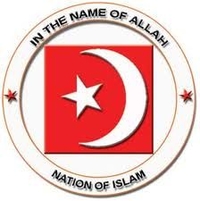 The ATI horrified the Detroit police, especially after one of its members ritualistically killed a man. Making a deal with Fard, the authorities let him out of a psychiatric ward on condition he shut down the ATI; Fard agreed, but then tricked the police by changing the ATI's name to Nation of Islam (NoI) and keeping it alive. He was finally forced to leave Detroit in mid-1934. Thereupon, Muhammad attempted to take control of the NoI, but he met with considerable opposition and was forced to flee to avoid being killed. His first stop was Chicago, then Milwaukee, then Washington, D.C., where he lived until 1942. There he took advantage of the opportunity to educate himself at the Library of Congress and to travel throughout the East, spreading his faith.
The ATI horrified the Detroit police, especially after one of its members ritualistically killed a man. Making a deal with Fard, the authorities let him out of a psychiatric ward on condition he shut down the ATI; Fard agreed, but then tricked the police by changing the ATI's name to Nation of Islam (NoI) and keeping it alive. He was finally forced to leave Detroit in mid-1934. Thereupon, Muhammad attempted to take control of the NoI, but he met with considerable opposition and was forced to flee to avoid being killed. His first stop was Chicago, then Milwaukee, then Washington, D.C., where he lived until 1942. There he took advantage of the opportunity to educate himself at the Library of Congress and to travel throughout the East, spreading his faith.
A light-skinned, diminutive man, Elijah Muhammad won converts not through his eloquence - or his command of grammar - but through a soft, Southern-accented intensity that audiences found somewhat reminiscent of the manner of a black Baptist preacher (which his father had been).* Although to nonbelievers it might seem hard to understand how he was able to rouse listeners to standing ovations or inspire their utter devotion, Clegg believes that he had the exact measure of his audience: "Something ineffable about this 'squeaky little man teaching hate' attracted African-Americans for an entire generation as few other leaders could."
 One representation of Mr. Yakub, "the big head scientist," |
This imaginative schema had the virtue of explaining both black weakness and white evil, even as it motivated blacks to prepare themselves through discipline and hard work to seize power. But as a theology, it differed almost diametrically from core Islamic beliefs. In his worst nightmare, a Muslim could hardly imagine a religion more repugnant to his own than one that identified God with a human being, excluded most of humanity on racial grounds, believed in a post-Muhammadan prophet, and held the Qur'an to be an imperfect, temporary document. Compared with these basic principles, such NoI practices as the avoidance of pork, intermittent study of Arabic, and separation of the sexes were but minor details. The NoI offered a folk religion with strong Christian overtones and hints of science fiction. It had little in common with standard Islam. In the intervening seven decades it has moved in that direction, but not by much.
Success
Muhammad hated the United States and loved its enemies, especially non-Caucasian ones. And so he rejoiced in the Japanese victory at Pearl Harbor in 1941, not only refusing to register for military service but instructing his followers to do likewise. Arrested for draft evasion in May 1942, he spent three years in jail on sedition charges, getting out in August 1946. The Nation had been kept alive during those years - barely - by his wife Clara and other faithful acolytes; on leaving prison, he found fewer than 400 active members. It was at this low point that Malcolm X turned up and, as Evanzz puts it, "gave new life to the Messenger."
Malcolm X joined the NoI in late 1948. After his release from jail in 1952, he devoted himself full-time to building the organization, and with great success. Members began to flow in - one notable newcomer, Louis Farrakhan, was recruited in 1955 by both Muhammad and Malcolm X - new temples and schools were opened, and a number of small commercial enterprises (a bakery, grocery store, restaurant) were established. The Nation also bought real estate, both urban and rural. The money added up, and it soon became the richest-ever black organization in the United States. In 1959, the national media discovered the NoI: Mike Wallace's television documentary, The Hate that Hate Produced, appalled whites but evidently thrilled many blacks, thousands of whom joined up as new members.
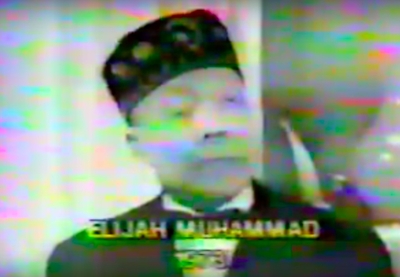 Screenshot from "The Hate That Hate Produced" (1959). |
Rot
But then, just as everything was looking good, rot set in: "rumors of oppressive disciplinary practices, deviations from the moral code, and financial irregularities," as Evanzz describes it. From the start, the NoI had been steeped in violence; I have already mentioned the "ritual sacrifice" that took place in 1932, when the organization was still called the Allah Temple of Islam. Through the decades, NoI members who presumed to disagree with Muhammad were injured or killed, a trend that culminated after 1960 with the assassination of Malcolm X (1965) and the murder of seven members of the Khaalis family (1973). Nor were whites immune: the notorious "Zebra" murders left nine dead in Illinois in 1972, and a year later a squad known as the Death Angels killed fourteen in the San Francisco area. And these were only the most spectacular atrocities.
Moral deviations likewise began in 1960: Elijah Muhammad's first illegitimate child was born in January of that year, the first of thirteen unrecognized children whom he fathered over a seven-year period with no fewer than seven different mistresses. FBI tapes record Muhammad handing each woman the same line about his "divine seed," then lying about his marital intentions; the FBI also found that he had five affairs going simultaneously, and that he threatened women with violence if they revealed his paternity. To his wife's special shame, among these relationships was an incestuous one.
Nor was this all. Newly affluent, Muhammad lavished luxuries on himself and the "royal" family, as it came to be known. He traveled in a Lockheed executive jet, wore a jewel-studded fez said to be worth $150,000, and let his family milk the NoI for all it was worth. In Clegg's careful words, this focus on money "ultimately validated, by example, a trend toward materialism, even avarice, that would hamper the Nation as a religious organization."
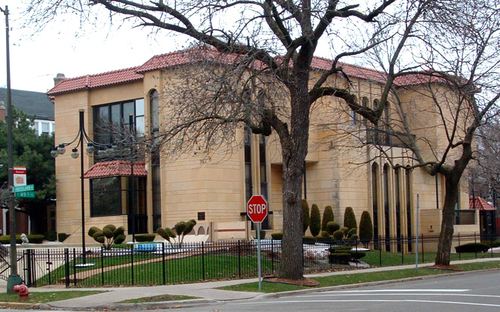 Elijah Muhammad's Chicago home and office. |
It is hard to convey just how shocking Muhammad's actions, especially his sexual ones, were to members of the moralistic NoI. His son Wallace later endeavored to explain it by saying that Elijah Muhammad had "been worshipped as the final prophet of God for so long that he had convinced himself that it was true," and helped himself to the liberties his status seemed to confer. But his behavior caused severe strains, putting the organization's very existence in jeopardy and forming perhaps the single most important reason for the rift with the upright Malcolm X.
Other consequences followed as well. Once he became the captive of his own avarice, Muhammad developed an operational timidity that was quite at odds with his fire-breathing rhetoric. He refused to sanction any response to police intrusions into NoI temples, and even took part in discussions with Ku Klux Klan leaders toward an arrangement whereby the NoI would stay out of "non-Negro" areas in return for the Klan's leaving NoI members alone. The head of the American Nazi party, George Lincoln Rockwell, was invited to speak at the NoI's main annual event, and used the occasion to laud Elijah Muhammad as the black Adolf Hitler (high praise, in his view).
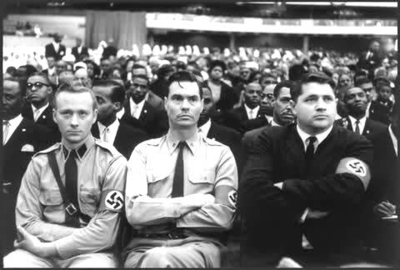 George Lincoln Rockwell (center), the American Nazi Party leader, at a Nation of Islam rally, Uline Arena, Washington, D.C., June 25, 1961. |
Death and Succession
To cap it off, Muhammad was entering into a slow process of physical deterioration, and this led to a protracted battle over his succession. In the end, there were just two contestants, his son Wallace and his national spokesman Louis Farrakhan. (The rupture with Malcolm X had ended with the latter's assassination by Muhammad's goons, apparently supervised by Farrakhan.) Each advanced his cause in imaginative ways - for example, Farrakhan married two of his daughters to Muhammad's nephew and grandson. But when Elijah Muhammad finally died in February 1975, Wallace hurriedly called a news conference and announced that his father had appointed him sole successor, and Farrakhan temporarily acquiesced.
Wallace undertook a thorough refashioning of the movement, purging it of its heterodox elements and turning it almost overnight into an Islamic institution that still exists; its current name is the Muslim American Society, and its membership is said to number around 200,000. He also dismantled the Fruit of Islam, sold the commercial establishments, and spun off most of the infrastructure.
Farrakhan, going along for a while, Arabized his first name (to Abdul Halim), studied Arabic and the Qur'an, and grew a beard. But it is clear that he disagreed with the changes initiated by Wallace, and in 1978 he mustered the resolve to split off and start his own competing organization, a revived Nation of Islam. For over two decades, Wallace - who today goes by the name of W. Deen Mohammed - and Louis Farrakhan have been bitter rivals. They make for an interesting contrast. Both born in 1933, they have known each other for over forty years but in terms of personality could hardly be less alike. W. Deen Mohammed is scholarly, and perhaps too intellectual to be a mass leader. Louis Farrakhan is an entertainer by training who became a brilliant orator and polemicist, given to extremist rhetoric that has regularly included a strong dose of anti-Semitism. He dominates his organization and thrives on controversy.
Fundamentally, the issue over which the two men have fought is which of them is the true son and heir to Elijah Muhammad. If W. Deen has the obvious biological advantage, Farrakhan married into the "royal family" and won many of its members to his side, and he also has remained far more faithful to Elijah Muhammad's basic message. The back cover of one of W. Deen Mohammed's books, Islam's Climate for Business Success, proclaims him "the foremost leader of Muslims throughout America and in many other parts of the world" (emphasis added). Farrakhan, by contrast, has few specifically Islamic aspirations; instead, he has sought recognition as the most powerful leader of American blacks.
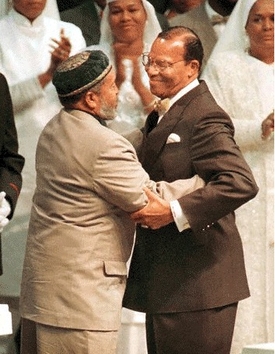 W. Deen Mohammed (L) and Louis Farrakhan embraced in February 2000. |
Legacy
 There still remains a profusion of other groups that continue to purvey the old unadulterated NoI message, but Farrakhan's decision to join forces with Muhammad, however clouded in its meaning, does signify a certain weakness and also points to a trend. As long ago as 1962, the author of a book-length study of the NoI noted that few who joined the Nation remained in it for very long. If that was true almost 40 years ago, it is even more true today. As blacks discover when they join and inevitably come into closer contact with the real thing, the NoI, whatever its claims to legitimacy, purveys a jumble of primitive and unsustainable myths with no connection to standard Islam. A folk religion founded in Detroit in the 1930's can hardly stand up to a religion with nearly fourteen centuries of history, nearly a billion adherents, 50 national governments to its name, and one of the world's great civilizations.
There still remains a profusion of other groups that continue to purvey the old unadulterated NoI message, but Farrakhan's decision to join forces with Muhammad, however clouded in its meaning, does signify a certain weakness and also points to a trend. As long ago as 1962, the author of a book-length study of the NoI noted that few who joined the Nation remained in it for very long. If that was true almost 40 years ago, it is even more true today. As blacks discover when they join and inevitably come into closer contact with the real thing, the NoI, whatever its claims to legitimacy, purveys a jumble of primitive and unsustainable myths with no connection to standard Islam. A folk religion founded in Detroit in the 1930's can hardly stand up to a religion with nearly fourteen centuries of history, nearly a billion adherents, 50 national governments to its name, and one of the world's great civilizations.
A number of other factors tend toward the NoI's eventual demise as well. Each of its many splinter groups, including Farrakhan's, is centered around a dominant figure and amounts to "little more," as Evanzz says, "than a cult of personality." When these aging leaders are gone, he continues, "all that will remain is a storefront temple here and there." Also relevant is the NoI's emphasis on hard work, thrift, and the family: this emphasis inculcates exactly the sort of habits that permit NoI members to escape poverty, but as they rise economically, they often seek a less sectarian faith. Some return to Christianity; more move on to standard Islam. But this, too, must be counted as part of the legacy of the redoubtable Elijah Muhammad. For all his foibles and failures, he clearly altered the course of black culture and politics. As Clegg notes:
The Muslims were "black" before it became fashionable to be labeled as such, and the Black Power Movement and all subsequent African-American protest styles, from the rhymes of the nationalistic rap group Public Enemy to the raison d'être of the Million Man March, are undeniably offshoots of the legacy of Elijah Muhammad.
True, the wilder notions of Muhammad's religion are disappearing; but all African-American Muslims today can claim him as their patron, for nearly every one of them has a direct connection, personal or familial, to the NoI. Without Muhammad, the million or so African-Americans who are now Muslims would almost certainly still be Christians.
Their numbers, moreover, are only likely to grow. Though Islam still exercises only modest appeal to white Americans, it has become a powerful and permanent presence among blacks, who by my rough calculation are 200 times more likely to convert to it than are whites. Nor is it hard to imagine such conversions beginning to cascade, in an Islamic pattern that, as the historian Richard Bulliet has established, goes back over a millennium. If that happens, Islam may well pull ahead of Christianity among blacks within a matter of decades.
There are signs of such momentum already. The Arabic name Malik, for example, has become one of the most popular given names for newborn black American boys, and in some years the most popular. In black culture, according to one scholar, "all African-American youths have at least some familiarity with Islam, either through a personal encounter, a relative, a friend, a fashionable item of apparel, or, as is more frequently the case today, in the form of rap music poems." Under this last heading, consider that such rap performers as Ice Cube, King Sun, KMD, Movement X, Queen Latifa, Poor Righteous Teachers, Prince Akeem, Sister Souljah, and Tribe Called Quest have all supported Farrakhan. A still more aggressive NoI offshoot named the Five Percenters claims the allegiance of Grand Puba, Big Daddy Kane, Lakim Shabazz, and Eric B. and Rakim. In the view of Farrakhan's biographer Mattias Gardell, the "hip-hop movement's role in popularizing the message of black militant Islam cannot be overestimated."
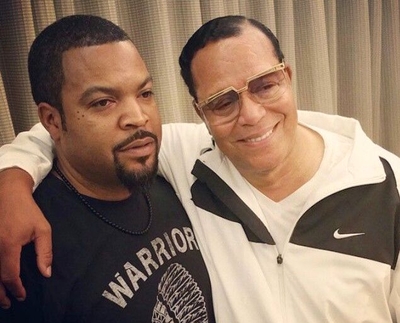 Ice Cube (L) with Louis Farrakhan. |
Among non-Muslim blacks, the enviable reputation enjoyed by Islam is traceable in good part to the discipline it is thought to impose on young men, thereby addressing what may be the black community's number-one problem. A Baptist woman whose son converted succinctly expressed this favorable disposition:
This Islam sounds like true religion to me. They don't believe in smoking dope, drinking liquor and no adultery. I say we could use more teaching like that. . . . When my son reached over to be a Muslim, I was not going to fault him. I enjoy listening to him talk about it, and how it came out of Africa, and that sounds pretty good.
From a social point of view, indeed, the new-found sobriety and seriousness of African-American converts to Islam, whether to the NoI or the standard version, are all to the good. Though violence and recidivism remain very real problems among these new Muslims - the recent arrest of Jamil Al-Amin (the former H. Rap Brown) on charges of having murdered a policeman in Atlanta is a case in point - the manly atmosphere of convert Islam has helped many ex-convicts and others at the bottom of society to find the straight path and stick to it.
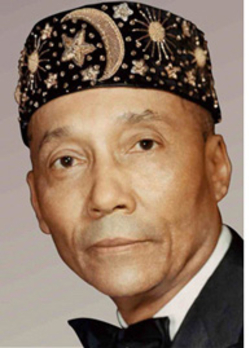 Elijah Muhammad, the "squeaky little man teaching hate." |
It does not take much imagination to see that, should Islam in fact replace Christianity as the primary religion of African-Americans, this will have vast significance for all Americans, affecting everything from race relations to foreign policy, from popular culture to issues of religion and state. Eric Lincoln, a leading authority on African-American Islam, once wrote that the Nation of Islam might "well change the course of history in the West." Should that come to pass, the credit, or blame, will belong above all to the "squeaky little man teaching hate," Elijah Muhammad.
* For an example of Elijah Muhammad speaking, see a 20-minute interview from1965 in which he blames Malcolm X for his own murder and summarizes the Nation of Islam theology.
For Daniel Pipes' writings on African-American Muslims, see the bibliography here.
Apr. 27, 2006 update: I today met Wallace Muhammad at a conference, "International Prayer for Peace," sponsored by Sant'Egidio on the Georgetown University campus. As one of the speakers, I saw him in the audience. When I went to him to say hello, he asked, "Are you the Arabian prince?" Sadly, I had to admit I was not, which seemed to disappoint him too. (I earlier had met his brother Akbar at a Princeton University conference on slavery in 1978.)
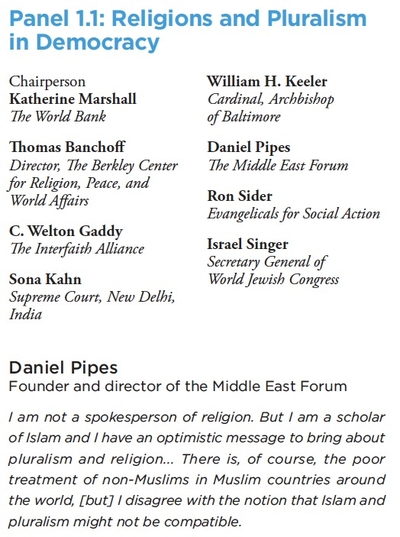
Aug. 11, 2014 update: I received a note on Facebook today:
Hi Mr. Pipes,
My name is Marie Muhammad. In my search for sharing the truth with others I found you. You wrote an excellent article on my great-grandfather, years ago, called 'How Elijah Muhammad Won.' I appreciate your passion in sharing and educating the masses with all that you do.
I was featured in Charisma in 2003 and today on the Harvest TV network, fast forward to 36:15, this is where my interview begins with my sister and I.
I want more and more people to know that Jesus Christ is Lord and my heart breaks for my family because so many are so deceived with this man made religion that my great-grandfather created. I would love to have an opportunity to interview with you one day.
God bless you,
Marie Muhammad
mariemuhammadspeaks.org
Comments: (1) I am now in contact with Ms Muhammad. (2) Perhaps Elijah Muhammad did not win quite as thoroughly as I thought in 2000.
Oct. 27, 2021 update: I focus in on one aspect of Elijah Muhammad's thought today at "How to Live as Long as Methuselah: Sample the Nation of Islam diet, as prescribed by Elijah Muhammad."
Feb. 2, 2023 update: Susannah Johnston of Focus on Western Islamism reports that
the Build Illinois Bond Fund, established in the mid-1980s to promote economic development in the state, appropriated the Coalition for the Remembrance of Elijah Muhammad (CROE) $500,000 in 2021 and 2022 and has signed off to give the same amount to the organization in 2023.
Feb. 16, 2023 update: New York City has named the intersection of West 127th Street and Malcolm X Boulevard in Manhattan "The Most Honorable Elijah Muhammad Way." The New York Post points out that the bitter irony that:
The corner is the site of the NOI-owned Mosque Temple No. 7, where Malcolm X long preached before that break — and where an NYPD officer was slain in 1972 (three years before Mohammad's death) by unidentified NOI radicals while responding to a false emergency call at the mosque.
